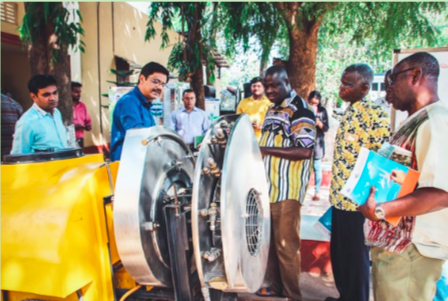CO-CREATING A GRASSROOTS A GRASSROOTS INNOVATION ECOSYSTEM IN AFRICA
Cooperation between SRISTI and ZEF (Zentrum für Entwicklungsforschung/ Center for Development Research) was signed in 2017 under the project “Program of Accompanying Research for Agricultural Innovation (PARI)”, funded by the German Federal Ministry of Economic Cooperation and Development (BMZ). Under this project SRISTI was tasked with carrying out the following tasks
- A study outlining and assessing the approaches of the Honey Bee Network in identifying, documenting and disseminating farmer innovations in India and how these could be adapted to the African context;
- Based on the study, a paper will be published in the frame of PARI (e.g. on PARI’s webpage or as ZEF working paper).
THE STUDY WILL EXPLORED THE FOLLOWING
1. Identifying innovations
– Which tools for identifying farmer innovations has the HBN employed to date?
-Which tools have been most effective and which were less successful (and why)?
2. Scaling
-To what extent have the identified innovations been scaled (incl. examples / case studies)?
-What tools are employed for scaling (e.g. scientific validation, documentation, commercialization, dissemination etc)?
-What factors have contributed to the success or failure of these tools?
3. Financing
-What has been the role of micro-venture funds in identifying and diffusing innovations?
4. Intellectual property rights
-What IPR provisions are used by the HBN to protect farmer innovations and share benefits that may arise from dissemination and commercialization?
-How well do the IPRs work in practice?
5. Adaptation to the African context
-How may the HBN approach and tools be adapted to suit the African context?
-Which of the farmer innovations collected in the HBN data could be relevant for African farmers.
Meeting with mutiple stakeholders have been carried out and it is hoped that this meeting along with follow-up by SRISTI will lead to the establishment of the the Honey Bee Network in Africa. More details will be uploaded when the research outputs are published.
WHAT IS PARI?
PARI brings together partners from Africa, India and Germany to contribute to sustainable agricultural growth and food and nutrition security in Africa and India as part of the One World – No Hunger initiative supported by the German government.
PUBLICATIONS
Fostering India-Africa Exchange of Agricultural Technologies and Know-How
Society for Research and Ini a ves for Sustainable Technologies and Ins tu ons (SRISTI) and Na onal Innova on Founda on (NIF), Grambharti
The group had the chance to learn about India’s research infrastructure and the integra on of grass- roots innova ons into the na onal innova on strategy at the Society for Research and Ini a ves for Sustai- nable Technologies and Ins tu ons (SRISTI) and the Na onal Innova on Founda on (NIF).
Thanks to more than 25 years of advocacy work, SRISTI has succeeded in genera ng na onwide recogni on for grassroots innova ons by Indian farmers and entrepreneurs as a valuable complement to innova ons that come out of formal research systems.
Set up in 2000 by India’s Department of Science and Technology, NIF is charged with documen ng, adding value and protecing the in- tellectual property rights of grassroots innovators and tradional knowledge-holders and dissemina ng their innovations. The African par cipants agreed that such locally developed and adapted grassroots innova ons could also bene t smallholder farmers in their countries and expressed their wish to explore similar approaches to iden fying, dissemina ng and protec ng such innova- ons in Africa.

Africa calling - Indo-African cooperation for grassroots innovations
To make any development process more inclusive, there is no escape from building upon creative and innovative experiments pursued by common people at village or semi-urban level. Many of these experiments lead to development of innovations, which can improve productivity and generate employment.
Some are retained as traditional knowledge (TK) practices. Even among the TK practices, experiments take place to produce innovative solutions to local problems. However, the purpose of a particular innovator may often be to solve his problem. But many times, the innovators solve the problems of third parties also. We call such innovations as Empathetic innovations.
There are not many mechanisms for him to share the knowledge, innovation or practices with other people in different regions. Sometimes, ideas and innovations get diffused through word of mouth. But many times, these ideas remain localized. In the process, potential growth and social development gets constrained.
To overcome this constraint, Honey Bee Network with a handful of volunteers triggered a movement, twenty four years ago to scout, spawn and sustain the unaided innovations and outstanding traditional knowledge from the informal sector of our country. The Network has presence in more than 75 countries but is much stronger in China, Malaysia, Namibia, etc.
Drawing upon this experience, SRISTI helped in setting up NIF (National Innovation Foundation – India) in 2000 with the help of Department of Science and Technology, Government of India, to scale up the idea of learning from grassroots innovators. It is committed to making India innovative by documenting,adding value, protecting the intellectual property rights of the contemporary unaided technological innovators, as well as of outstanding traditional knowledge holders.
It aims at promoting lateral learning among local communities to generate low cost extremely affordable solutions of the persistent and emerging problems, and support the diffusion of innovations on a commercial as well as non-commercial basis.

